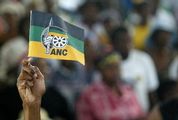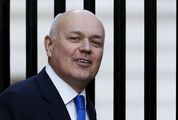AS ECONOMIC storm clouds gather rapidly on the horizon, we are about to learn what being a grown-up nation really feels like. It can be a scorching experience because tough decisions are seemingly always on the horizon and usually arrive in the night, with mid-morning as a deadline.
I cannot recall any time since 1994 when the country, the state in particular, needed to be so careful in what it does next, be it the economy or profound political decisions. The year ended on an ulcer-inducing note as President Jacob Zuma removed finance minister Nhlanhla Nene in an economic environment that is failing to grow as needed and a currency that has depreciated significantly since the beginning of the year.
The last thing SA needed was for the finance minister to be removed for so unconvincing a reason, but there was always more to deal with than a "Van Rooyen moment" that never quite materialised. El Nino has delivered the most severe drought the country has seen in a long time, while missteps in policy-making and unhelpful political rhetoric have conjured up an uncertain milieu for investment.
When Nene tabled the medium-term budget policy statement in October, the signs were there that the skies were darkening, but like all of us entering adulthood, we still believed petulance and a patient parent would make it all go away. At the very moment he began his speech, the palisade fencing around Parliament was straining against the weight of student protesters demanding that universities rescind tuition-fee increases.
In a bizarre response, a spooked Higher Education Minister Blade Nzimande leaned against the fence as he waited to address students. Defence Minister Nosiviwe Mapisa-Nqakula and Police Minister Nathi Nhleko flanked Nzimande. State Security Minister David Mahlobo was on hand.
Quite why it became necessary for these specific ministers to put up a "show of force" isn’t clear, but it’s useful for insight. The students’ demands were not only unsurprising, but a foreseeable outcome of a higher education funding formula that had long been unsustainable.
But there’s more. Since 2008 about 1-million people have lost their jobs or given up looking. Many of them have children and dependants who need education. The population is growing fast, but the economy is stuttering like an old engine. Unemployment is high, and growing.
At some point, the strains were going to show, and they did. The biting drought, meanwhile, is fuelling increases in food prices amid piercing cries of desperation from farmers.
So here is the perfect storm. Just a little while before all of this played out, the government had bowed to pressure on public service salaries. To give effect to the agreement, it had to empty the contingency reserve fund, the "rainy day" money Parliament allows to be kept in reserve when it approves the budget. It wasn’t much at R5bn, but it was better than nothing.
Soon thereafter, the students put up their collective hand with a show of force at Parliament, the Union Buildings and Luthuli House. The African National Congress (ANC) and government were rattled, but there was no money. The parents and siblings of the same students were receiving it in their salaries that very month. Then the drought story couldn’t be avoided any longer, and farmers needed urgent relief. We need to declare the drought a national disaster, but we can’t because it requires mobilisation of funds. The contingency reserve could have helped to an extent, but it’s empty this financial year.
In response, Mr Zuma has appointed a commission to probe university funding, that can only arrive at the same conclusions Deputy President Cyril Ramaphosa’s report came to. Drought-relief funding cannot come until the new financial year. It’s an election year and expenditure from current budgets can hardly be diverted to students and farmers, yet the latter owes banks more than R100bn by some estimates.
The longer farmers wait for rescue, the more likely a farming problem will become a banking problem. It will also become a trade and current account deficit problem, and an inflation problem as we import more food.
In our bad foreign exchange rate scenario, this induces inflation, which in turn triggers interest rate increases and mortgage bond foreclosures for households already under severe financial strain.
So you see, there is no time for political and ideological flights of fancy by any of us. The focus should be on pragmatic policy-making, brutal fiscal management for longer-term benefit, and investment in areas we are reasonably certain will deliver a return on investment, such as tourism.
The students still want money for free tertiary education. Service delivery protests will spike, as they do in an election year. But there is no money, so we have to trim expenditure in certain areas. This is what the grown-ups in the real economy will be doing, and it’s time our government did the same.
...
WE HAVE been and will continue publishing a series of interviews with prominent and insightful South Africans about our country, its politics and future.
At a time such as this, their views and knowledge may just help us talk about things we otherwise wouldn’t, and need to.
Sam Mkokeli has been great with this, starting with his interview with former deputy president Kgalema Motlanthe.
Mavuso Msimang, the man at the centre of the multipronged turnaround at the Department of Home Affairs some years ago, and an ANC veteran of many decades standing, also spoke to us. After such a wide-ranging and long discussion we should have read the quotes we were going to use back to him. We didn’t. I hope no one gives him a hard time.
He’s been a good sport about it, which is why I want, nonetheless, to apologise to him. We’ll take particular care next time.

Jacob Zuma. Picture: REUTERS/STEFANIE LOOS
AS ECONOMIC storm clouds gather rapidly on the horizon, we are about to learn what being a grown-up nation really feels like. It can be a scorching experience because tough decisions are seemingly always on the horizon and usually arrive in the night, with mid-morning as a deadline.
I cannot recall any time since 1994 when the country, the state in particular, needed to be so careful in what it does next, be it the economy or profound political decisions. The year ended on an ulcer-inducing note as President Jacob Zuma removed finance minister Nhlanhla Nene in an economic environment that is failing to grow as needed and a currency that has depreciated significantly since the beginning of the year.
The last thing SA needed was for the finance minister to be removed for so unconvincing a reason, but there was always more to deal with than a "Van Rooyen moment" that never quite materialised. El Nino has delivered the most severe drought the country has seen in a long time, while missteps in policy-making and unhelpful political rhetoric have conjured up an uncertain milieu for investment.
When Nene tabled the medium-term budget policy statement in October, the signs were there that the skies were darkening, but like all of us entering adulthood, we still believed petulance and a patient parent would make it all go away. At the very moment he began his speech, the palisade fencing around Parliament was straining against the weight of student protesters demanding that universities rescind tuition-fee increases.
In a bizarre response, a spooked Higher Education Minister Blade Nzimande leaned against the fence as he waited to address students. Defence Minister Nosiviwe Mapisa-Nqakula and Police Minister Nathi Nhleko flanked Nzimande. State Security Minister David Mahlobo was on hand.
Quite why it became necessary for these specific ministers to put up a "show of force" isn’t clear, but it’s useful for insight. The students’ demands were not only unsurprising, but a foreseeable outcome of a higher education funding formula that had long been unsustainable.
But there’s more. Since 2008 about 1-million people have lost their jobs or given up looking. Many of them have children and dependants who need education. The population is growing fast, but the economy is stuttering like an old engine. Unemployment is high, and growing.
At some point, the strains were going to show, and they did. The biting drought, meanwhile, is fuelling increases in food prices amid piercing cries of desperation from farmers.
So here is the perfect storm. Just a little while before all of this played out, the government had bowed to pressure on public service salaries. To give effect to the agreement, it had to empty the contingency reserve fund, the "rainy day" money Parliament allows to be kept in reserve when it approves the budget. It wasn’t much at R5bn, but it was better than nothing.
Soon thereafter, the students put up their collective hand with a show of force at Parliament, the Union Buildings and Luthuli House. The African National Congress (ANC) and government were rattled, but there was no money. The parents and siblings of the same students were receiving it in their salaries that very month. Then the drought story couldn’t be avoided any longer, and farmers needed urgent relief. We need to declare the drought a national disaster, but we can’t because it requires mobilisation of funds. The contingency reserve could have helped to an extent, but it’s empty this financial year.
In response, Mr Zuma has appointed a commission to probe university funding, that can only arrive at the same conclusions Deputy President Cyril Ramaphosa’s report came to. Drought-relief funding cannot come until the new financial year. It’s an election year and expenditure from current budgets can hardly be diverted to students and farmers, yet the latter owes banks more than R100bn by some estimates.
The longer farmers wait for rescue, the more likely a farming problem will become a banking problem. It will also become a trade and current account deficit problem, and an inflation problem as we import more food.
In our bad foreign exchange rate scenario, this induces inflation, which in turn triggers interest rate increases and mortgage bond foreclosures for households already under severe financial strain.
So you see, there is no time for political and ideological flights of fancy by any of us. The focus should be on pragmatic policy-making, brutal fiscal management for longer-term benefit, and investment in areas we are reasonably certain will deliver a return on investment, such as tourism.
The students still want money for free tertiary education. Service delivery protests will spike, as they do in an election year. But there is no money, so we have to trim expenditure in certain areas. This is what the grown-ups in the real economy will be doing, and it’s time our government did the same.
...
WE HAVE been and will continue publishing a series of interviews with prominent and insightful South Africans about our country, its politics and future.
At a time such as this, their views and knowledge may just help us talk about things we otherwise wouldn’t, and need to.
Sam Mkokeli has been great with this, starting with his interview with former deputy president Kgalema Motlanthe.
Mavuso Msimang, the man at the centre of the multipronged turnaround at the Department of Home Affairs some years ago, and an ANC veteran of many decades standing, also spoke to us. After such a wide-ranging and long discussion we should have read the quotes we were going to use back to him. We didn’t. I hope no one gives him a hard time.
He’s been a good sport about it, which is why I want, nonetheless, to apologise to him. We’ll take particular care next time.





















Change: 1.19%
Change: 1.36%
Change: 2.19%
Change: 1.49%
Change: -0.77%
Data supplied by Profile Data
Change: -0.19%
Change: 0.69%
Change: 1.19%
Change: 0.00%
Change: 0.44%
Data supplied by Profile Data
Change: 0.62%
Change: 0.61%
Change: 0.23%
Change: 0.52%
Change: 0.12%
Data supplied by Profile Data
Change: -0.21%
Change: -1.22%
Change: -0.69%
Change: -0.51%
Change: 0.07%
Data supplied by Profile Data